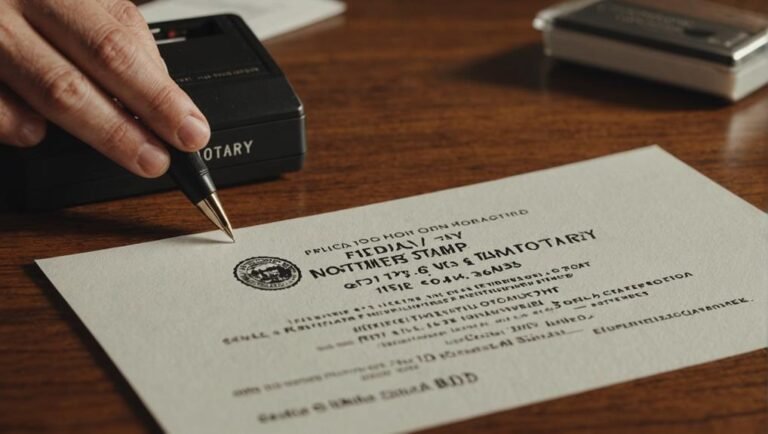In Florida, you aren't mandated to keep a notary journal, but it's highly recommended. Journals aid in meticulous record-keeping, safeguarding against misconduct allegations, and documenting notarial acts. They enhance your professionalism and credibility within the profession. Plus, journals provide a chronological reference of notarizations and evidence if legal disputes arise. Remember, although not required, maintaining a journal voluntarily can offer you invaluable benefits and protection.
Key Takeaways
- Florida law does not mandate notaries to keep a journal.
- Keeping a journal is a recommended practice for protection.
- Journals document notarial acts, aiding in legal disputes.
- Notaries can voluntarily choose to maintain a journal.
- Journals enhance credibility, providing a record of notarizations.
Florida Notary Journal Requirement
While Florida doesn't legally mandate notaries to maintain a journal, it's highly recommended by the Governors Task Force on Notaries Public in 1989.
The Florida Notary Journal plays an essential role in documenting notarial acts conducted by notaries public. If a notary in Florida opts to keep a journal, it should contain consecutively numbered pages and record necessary information for each notarial act performed.
These journals should be retained for a minimum of 5 years and made available for inspection by authorities if required. Notary journals can be acquired from bonding agencies, office supply stores, or national organizations specializing in notary supplies.
Importance of Notary Journals
Notary journals serve as essential documentation tools for recording all notarial acts performed by notaries public in Florida. These journals are vital for maintaining accurate records and ensuring adherence to state requirements.
Here's why notary journals are of utmost importance:
- Compliance: Notary journals help in maintaining a chronological record of notarizations, ensuring that all procedures adhere to Florida state laws.
- Protection: By keeping detailed records of notarial acts, notaries are better protected in case of legal disputes or challenges to the authenticity of a document.
- Transparency and Accountability: Notary journals enhance transparency by providing a clear trail of all notarial acts performed, promoting accountability and professionalism within the notary public profession.
Notary Journal Specifications
To understand the meticulous requirements governing notary journal specifications in Florida, familiarize yourself with the structured format and durable construction of these essential documentation tools. Florida notary journals are meticulously designed to meet state regulations and provide a reliable record of every notarial act. Below is a table summarizing the key specifications of notary journals in Florida:
| Specifications | Details |
|---|---|
| Page Count | 128 heavy-weight pages |
| Entries per Page | 4 entries per page |
| Numbered Entries | 496 individually numbered entries |
| Additional Features | Checkboxes for quick entry completion |
The 128 heavy-weight pages in these journals provide ample space for recording notarial acts, with each page accommodating 4 entries for clear and organized documentation. The inclusion of checkboxes further streamlines the entry process, ensuring accuracy and efficiency. Additionally, the durable construction of Florida notary journals guarantees long-lasting use, making them a reliable tool for notaries in the state.
Retention Period for Journals
For Florida notaries who choose to maintain a journal, it's important to adhere to the state-mandated retention period of at least 5 years. The details of this requirement are essential to guarantee compliance with Florida's notary practices:
- Retention Period Initiation: The 5-year retention period begins from the date of the last entry made in the Notary Journal. It's significant to mark this date accurately to track the duration effectively.
- Secure Storage: Notaries must store their journals securely to prevent loss, damage, or unauthorized access. Storing the journal in a safe and accessible location guarantees that it can be produced promptly if requested by authorities.
- Physical or Digital Format: Florida notaries have the option to maintain their Notary Journals in either physical or digital format for the entire retention period. Both formats are acceptable as long as they meet the state's requirements for content and preservation.
Benefits of Ejournals
Utilizing ejournals for notarial record-keeping provides Florida notaries with numerous advantages, including secure cloud-based storage and easy accessibility from any location.
Notary journals kept electronically offer a high level of data protection through secure cloud storage, ensuring that sensitive information is safeguarded against loss or unauthorized access. The convenience of accessing electronic notarial records from anywhere simplifies the process of maintaining accurate and up-to-date information.
Automatic backups further contribute to data security by preventing any potential loss of pivotal records. By utilizing ejournals, notaries can stay organized and easily comply with state regulations regarding notarial record-keeping.
This digital solution streamlines the record-keeping process, offering efficiency and peace of mind to notaries in Florida. Embracing ejournals for notarial entries enhances the overall management of notarial records, providing a modern and secure approach to maintaining essential documentation.
Florida Law on Notary Journals
Within the guidelines of Florida law, notaries aren't explicitly mandated to maintain a journal, although it comes highly recommended by the Governors Task Force on Notaries Public. When opting to keep a notary journal in Florida, here are some key points to take into account:
- Recording Requirements: Journals should have consecutively numbered pages and record essential information for each notarial act performed, such as the date, time, type of notarial act, and the name of the signer.
- Retention Period: Completed journals should be retained for at least 5 years to comply with best practices and potential legal requirements, ensuring that notaries have a record of their notarial acts.
- Availability: Notary journals can be obtained from bonding agencies, office supply stores, and national organizations for notaries in Florida, making it easily accessible for notaries to maintain accurate records of their notarial activities.
Usefulness of Journals
Journals play an important role in the notarial process, serving as a detailed record of every notarial act performed. Notary Journals, also known as Notary Record Books, are invaluable tools for notaries to maintain accurate records of their transactions. Here is a table highlighting the usefulness of these journals:
| Benefits of Notary Journals | Description |
|---|---|
| Legal Evidence | Journals provide essential evidence in legal disputes. |
| Customer Confidence | Helps build trust with clients and discourages fraud. |
| Memory Aid | Enables notaries to recall past events accurately. |
| Compliance Verification | Ensures compliance with laws and regulations. |
| Confidentiality | Notaries must keep journals private for accuracy. |
Product Description & Details
What key details characterize the Florida Notary Record Book (Journal) offered by the American Association of Notaries?
The journal provides an essential tool for notaries in Florida to maintain accurate records of their notarial acts.
Here are some key features of the American Association of Notaries' Florida Notary Record Book:
- Ample Entries: With 242 entries available, this journal offers ample space for Florida notaries to document their notarial acts thoroughly and securely.
- Organizational Layout: The journal is thoughtfully designed to help notaries efficiently organize their notarial acts, ensuring easy access to critical information when needed.
- Protection: By using this journal, Florida notaries can enhance the protection of their notarial records, safeguarding themselves in case of legal disputes or the need to provide evidence of past notarial acts.
This Florida Notary Record Book from the American Association of Notaries is a valuable resource for notaries looking to uphold best practices and maintain accurate notarial records.
Shipping & Delivery Information
When ordering Florida notary journals from the American Association of Notaries, you can expect prompt shipping and various delivery options to suit your needs. Orders typically ship the next business day if placed before noon CST. The delivery options available include US Postal Service (4-7 days), US Priority Mail (2-3 days), and UPS Ground (2-5 days). If you prefer faster delivery, contacting Customer Service at 713-644-2299 can provide you with expedited options. Shipping costs range from $7.95 for USPS to $14.95 for UPS Ground. For your convenience, complete Shipping & Delivery Information is provided to ensure transparency in the process.
| Delivery Option | Estimated Delivery Time | Shipping Cost |
|---|---|---|
| US Postal Service | 4-7 days | $7.95 |
| US Priority Mail | 2-3 days | $9.95 |
| UPS Ground | 2-5 days | $14.95 |
Frequently Asked Questions
What Is the Requirements to Notarize a Document in Florida?
To notarize a document in Florida, you must meet notary qualifications, verify identities, and use a notary stamp. Document requirements include proper completion. It is recommended to keep a notary journal for record-keeping purposes.
What Does a Notary Need for Recording in Florida?
To prioritize compliance and meticulous record-keeping, a notary in Florida must focus on documentation. You need to maintain detailed records of notarial acts, reflecting your responsibilities and upholding standards of professionalism and accuracy.
Should I Keep a Notary Journal?
You should keep a notary journal as part of your notary responsibilities. It's essential for documenting all notarial acts and any special circumstances. This record can serve as valuable evidence for document verification and legal compliance.
What Types of Notarial Acts Are Not Required to Be Recorded in the Notarial Journal but Are Recommended Oregon?
When notarizing in Oregon, it's best practice to record optional acts like copy certifications and protests in your journal. Although not mandatory, including these in your journal enhances transparency, accountability, and can help in legal disputes.
Conclusion
So, does Florida require a notary journal? Yes, they do.
In fact, did you know that according to the National Notary Association, nearly 80% of notaries use a journal regularly to record their notarial acts?
Keeping a notary journal isn't only a legal requirement in Florida, but it also provides a valuable record of your notarial acts for protection against fraud and liability.
Make sure you stay compliant and protect yourself by keeping a detailed notary journal.






